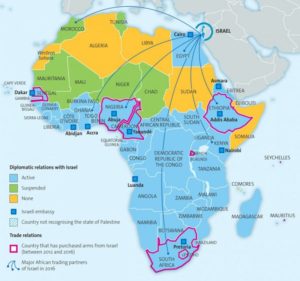Christian Zionism in Africa: An Introduction by Cynthia Holder Rich
Part III of a 3-part series
If you’ve been reading the posts this week (for Tuesday or for Wednesday or both), you have learned about Christian Zionism, a movement that arose first in Britain and became highly popular in the US. In the latter part of the 20th century, the movement has become a significant factor in Christian churches in the global south—South America, Asia, and in Africa. At first glance this can be confusing, as GUILT ABOUT THE HOLOCAUST drove interest and investment in Christian Zionism after World War II, and helped make the establishment of the modern State of Israel possible. African, Asian, and South American Christians took no part in the decisions that led to the Holocaust. So—what gives? How did Christian Zionism gain a foothold in the Southern Hemisphere? Today, I share some about Christian Zionist activity in Africa. There are a few things to know to understand.
 FIRST: GEOPOLITCAL HISTORY IS IMPORTANT. The modern State of Israel was established in 1948. Many African countries became independent in the 1950s and 1960s. The new state of Israel was established in a hostile neighborhood and needed friends—so Israel reached out to many newly independent African nations, and enjoyed strong ties with many of them—UNTIL the 1967 and 1973 wars, during which Israel conquered and claimed territory that had been designated for a future Palestinian state. As former occupied colonies, African nations saw the actions of Israel in ways that felt painfully familiar. After 1973, many African governments broke ties with Israel and became very pro-Palestinian. Former Israeli Prime Minister Benjamin Netanyahu aimed to change that. He made it clear that the support of Palestine and its interests in Africa was a problem, and he meant to “dissolve this majority, this giant bloc…of African countries that is the basis of the automatic majority against Israel in the UN and international bodies”[1]. Israel offered security, military, and humanitarian assistance to many countries on the African continent, in exchange for support in international forums. Netanyahu’s work paid off for many reasons—chief among them the poverty of those to whom he offered help. Changing your vote may have seemed a small price to pay for badly needed assistance.
FIRST: GEOPOLITCAL HISTORY IS IMPORTANT. The modern State of Israel was established in 1948. Many African countries became independent in the 1950s and 1960s. The new state of Israel was established in a hostile neighborhood and needed friends—so Israel reached out to many newly independent African nations, and enjoyed strong ties with many of them—UNTIL the 1967 and 1973 wars, during which Israel conquered and claimed territory that had been designated for a future Palestinian state. As former occupied colonies, African nations saw the actions of Israel in ways that felt painfully familiar. After 1973, many African governments broke ties with Israel and became very pro-Palestinian. Former Israeli Prime Minister Benjamin Netanyahu aimed to change that. He made it clear that the support of Palestine and its interests in Africa was a problem, and he meant to “dissolve this majority, this giant bloc…of African countries that is the basis of the automatic majority against Israel in the UN and international bodies”[1]. Israel offered security, military, and humanitarian assistance to many countries on the African continent, in exchange for support in international forums. Netanyahu’s work paid off for many reasons—chief among them the poverty of those to whom he offered help. Changing your vote may have seemed a small price to pay for badly needed assistance.

SECOND: BLESSINGS AND CURSES ARE IMPORTANT. Christian Zionist actors and organizations often quote Genesis 12:3a (yes, you heard that right—only half the verse is quoted). This verse is part of the call of the LORD to Abram (who became Abraham) to leave country and kin and go where the LORD showed him to go. The verse in question reads
I will bless those who bless you, and the one who curses you I will curse…
Genesis 12:3a, NRSV
You can see this verse in use in a number of Christian Zionist organization websites and printed material—no surprise, as this is THE VERSE that gives concrete evidence that God will bless those who bless Israel AND curse those who curse Israel. In the poverty in which many in Africa live, move, and have their being, this verse seems to suggest that there is a way out of poverty and the suffering it causes. Bless Israel! Pray for Israel! Give offerings for Israel! You will be blessed! Blessing, in this case, means MATERIAL WEALTH AND PROSPERITY. Christian Zionist organizations and actors are very careful to connect these dots. A high official of a US-based Christian Zionist organization visited the former president of Tanzania in early 2020, encouraging the president to move the Tanzanian embassy in Israel from Tel Aviv (which is where most embassies have traditionally been built) to Jerusalem (which is very much contested space, fights about which did not end when the former president of the US chose to move the US embassy there in 2017). The Christian Zionist official stated to the president of Tanzania that if the Tanzanian embassy in Israel was moved to Jerusalem, Tanzania would have “ten years of the fatted calf”.[2]
While reflecting on this narrative, those who follow Jesus need to remember Jesus’ view of how blessings work.
Then Jesus began to speak, and taught them, saying:
Blessed are the poor in spirit, for theirs is the kingdom of heaven.
Blessed are those who mourn, for they will be comforted.
Blessed are the meek, for they will inherit the earth.
Blessed are those who hunger and thirst for righteousness, for they will be filled.
Blessed are the merciful, for they will receive mercy.
Blessed are the pure in heart, for they will see God.
Blessed are the peacemakers, for they will be called children of God.
Blessed are those who are persecuted for righteousness’ sake, for theirs is the kingdom
of heaven.
Blessed are you when people revile you and persecute you and utter all kinds of evil
against you on my account. Rejoice and be glad, for your reward is great in heaven,
for in the same way they persecuted the prophets who were before you.
Matthew 5:2-12, NRSV
This is not the kind of tit for tat transaction a US Christian Zionist official spoke of to a Tanzanian president. There are no fatted calves promised here. Blessings, according to Jesus, are both more valuable and very, very different than a showering of material wealth.
FINALLY: HOW YOU READ THE BIBLE IS IMPORTANT. Christian Zionists believe that several Biblical texts, including II Chronicles 6:5-6; Isaiah 11:11; Ezekiel 20:34; and Amos 9:14-15, among others—texts that many Biblical scholars see as referring to the return of the people of Israel from exile in Babylon—actually refer to the establishment of the State of Israel in 1948. Those who read the Bible this way also equate the people of ancient Israel with the people of modern Israel. They also have decided that Jesus cannot return until Israel is back in Jerusalem—which energized huge Christian Zionist celebrations when the former US president recognized Jerusalem as the capital of Israel.
Across many Christian communities in Africa, the Bible is read in ways that are very much influenced by these interpretations.
To follow Jesus, however, is to be led by his Good News—which is found specifically and especially in the Gospels. A thorough review of Christian Zionist literature online and in hard copy shows almost no reference to the Gospels. It is hard, then, to see how this movement identifies as Christian.
To encourage poor Christians in poor countries to engage in transactional blessing of, praying for, and giving funds to Israel—which is one of the richest countries in the world—does not bring the ministry of Jesus to mind. It does, however, offer opportunities to think about whether bargaining for the favor of God is what it means to follow Christ.
[1] Gruzd, Steven, Carmel Rawhani and Larry Benjamin (July 2018) “Israel’s ties with Africa: a focus on Ethiopia, Kenya, Nigeria and South Africa”, Occasional Paper 284, South African Institute of International Affairs, pp 9-10
[2] ICEJ Staff (15 January 2020) “ICEJ in Tanzania and Finland”, International Christian Embassy Jerusalem
 Cynthia Holder Rich is the founding director of ecclesio.com, currently serving on the Faculty of Theology of Tumaini University Makumira, Arusha, Tanzania. She edited Christian Zionism in Africa (Fortress Academic, 2021) and co-chairs the Theology Working Group of the Presbyterian Church (USA)’s international, ecumenical initiative to confront Christian Zionism.
Cynthia Holder Rich is the founding director of ecclesio.com, currently serving on the Faculty of Theology of Tumaini University Makumira, Arusha, Tanzania. She edited Christian Zionism in Africa (Fortress Academic, 2021) and co-chairs the Theology Working Group of the Presbyterian Church (USA)’s international, ecumenical initiative to confront Christian Zionism.



